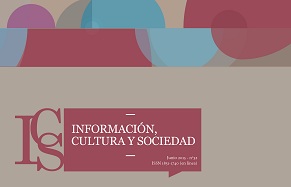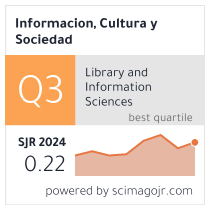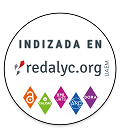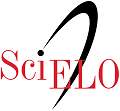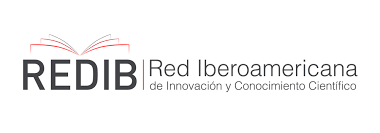Digital Literacy Skills in Postgraduate Students at the Universidad Tecnologica Metropolitana
Abstract
Due to the increased use of technology in educational contexts, digital literacy has turned into an essential element for students to have a good performance. In postgraduate studies, they are expected to demonstrate these competences, especially in research. The following study aims to explore graduate students at the Universidad Tecnológica Metropolitana’s perception of their digital literacy abilities in the research context. Through a survey based on the Digital Competences for Citizens, the research sought to identify the levels of development of the digital literacy competences of graduate students. The results show that the participants declare to have a general knowledge of the field, especially highlighting the security dimension. Besides, it also reveals areas for improvement, such as the knowledge about copyright and digital identity protection. The findings demonstrate the necessity of implementing mechanisms and strategies for improving the digital literacy in graduate students of the institution. ARK CAICYT: https://id.caicyt.gov.ar/ark:/s18511740/qkgblks2bDownloads
References
Alfonzo, Paige y Jennifer Batson. 2014. Utilizing a co-teaching model to enhance digital literacy instruction for doctoral students. En International Journal of Doctoral Studies. No. 9, 61–71. <https://ijds.org/Volume9/IJDSv9p061-071Alfonzo0572.pdf> [Consulta: 15 diciembre 2023].
Arranz, Nieves, Francisco Ubierna, Marta Arroyabe, Carlos Perez y JC Arroyabe. 2017. The effect of curricular and extracurricular activities on university students’ entrepreneurial intention and competences. En Studies in Higher Education. Vol.42, no. 11, 1979–2008. <https://doi.org/10.1080/03075079.2015.1130030>
Astorga, Javiera. 2022. Relación entre la alfabetización digital y el rendimiento académico en cursos vía remota en estudiantes de enfermería de una universidad privada. Santiago de Chile: Universidad Finis Terrae. Tesis de Magíster. <https://repositorio.uft.cl/items/6b5f8401-f4ca-42e6-be06-083a6e2223af> [Consulta: 20 diciembre 2023].
Avello Martínez, Raidell, Raúl López Fernández, Manuel Cañedo Iglesias, Hugandy Álvarez Acosta, John Fernando Granados Romero y Francisco Marcelo Obando Freire. 2013. Evolución de la alfabetización digital: nuevos conceptos y nuevas alfabetizaciones. En Medisur, Vol. 11, no. 4, 450-457. <http://www.medisur.sld.cu/index.php/medisur/article/view/2467> [Consulta: 19 agosto 2023].
Bell, Diane. 2021. A qualitative investigation of the digital literacy practices of doctoral students. En Journal of Information Literacy. Vol.15, no. 3, 82-99. <https://doi.org/10.11645/15.3.2829>
Bergdahl, Nina, Jalal Nouri y Uno Fors. 2020. Disengagement, engagement and digital skills in technology-enhanced learning. En Education and Information Technology. No. 25, 957–983. <https://doi.org/10.1007/s10639-019-09998-w>
Blázquez, Minerva, Dolores Gómez, Isidora Frontaura, Adbón Camacho, Francisco Rodríguez y Higino Toriz. 2017. Uso de internet por los adolescentes en la búsqueda de información sanitaria. En Atención Primaria. Vol. 50, no. 9, 547-552. <https://doi.org/10.1016/j.aprim.2017.06.005>
Cabero-Almenara, Julio. 2020. Tecnología y enseñanza: retos y nuevas tecnologías y metodologías. En CITAS. Vol. 6, no. 1, 1-13. <https://doi.org/10.15332/24224529.6356>
Cane, Julieta. 2019. Más allá del primer link: Jóvenes y búsqueda de información. En Revista Argentina de Estudios de Juventud. Vol. 13, no. 28, 1-17. <https://doi.org/10.24215/18524907e028>
Cantón-Mayo, Isabel, Ruth Cañon-Rodríguez y Mario Grande de Prado. 2017. La comunicación como subdimensión de la competencia digital en futuros maestros de primaria. En Pixel-Bit: Revista de Medios y Educación. No. 50, 33-47. <https://recyt.fecyt.es/index.php/pixel/article/view/61763> [Consulta: 15 agosto 2024].
Cassany, Daniel. 2002. La alfabetización digital. En XIII Congreso Internacional de la Asociación de Lingüística y Filología de América Latina (ALFAL) La escritura y la enseñanza en el entorno digital. (13: 18-23 de febrero 2002: San José, Costa Rica). Trabajos presentados. Ciudad Universitaria Rodrigo Facio, Universidad de Costa Rica. <https://es.studenta.com/content/122391378/alfabetizacion-digital-cassany> [Consulta: 12 julio 2023].
Castillejos López, Berenice. 2019. Gestión de información y creación de contenido digital en el prosumidor millennial. En Apertura. Vol. 11, no. 1, 24-39. <https://doi.org/10.32870/ap.v11n1.1375>
Cázares, Yolanda. 2009. La autodirección, la persona autodirigida y sus componentes: definiciones conceptuales. En El Tintero. Vol. 9, no. 38, 1-4.
Coffin Murray, Meg y Jorge Pérez. 2014. Unraveling the Digital Literacy Paradox: How Higher Education Fails at the Fourth Literacy. En Issues in Informing Science and Information Technology. Vol. 11, 85-100. <http://iisit.org/Vol11/IISITv11p085-100Murray0507.pdf> [Consulta: 15 octubre 2023].
Combes, Barbara. 2009. Digital Natives or Digital Refugees? Why we have failed Gen Y? En IASL Conference Preparing Pupils and Students for the Future. (2-4 de septiembre 2009: Abano Terme - Padova, Italia). Trabajos presentados. Italia: School Libraries in the Picture. <https://doi.org/10.29173/iasl7656>
Comisión Europea. 2017. Comunicación de la Comisión al Parlamento Europeo, al Consejo, al Comité Económico y Social Europeo y al Comité de las Regiones: sobre una agenda renovada de la UE para la educación superior. Bruselas: Comisión Europea. <https://eur-lex.europa.eu/legal-content/ES/TXT/PDF/?uri=CELEX:52017DC0247&from=DA> [Consulta: 31 octubre 2023].
Dedebali, Nurhak Cem. 2020. Analysis of Digital Literacy and Metaphoric Perceptions of Teacher Candidate. En International Journal of Educational Methodology. Vol. 6, no. 1, 135-145. <https://doi.org/10.12973/ijem.6.1.135>
English, Jacob. 2016. A digital literacy initiative in honors: Perceptions of students and instructors about its impact on learning and pedagogy. En Journal of the National Collegiate Honors Council. Vol.17, no. 2, 125-155.
<https://digitalcommons.unl.edu/nchcjournal/533/> [Consulta: 15 agosto 2024].
Farias-Gaytan, Silvia, Ignacio Aguaded y María Soledad Ramírez-Montoya. 2023. Digital transformation and digital literacy in the context of complexity within higher education institutions: a systematic literature review. En Humanities and Social Sciences Communications. Vol. 10, no. 1, 1-11. <https://doi.org/10.1057/s41599-023-01875-9>
Fernández Muñoz, Ricardo. 2004. Hacia un nuevo paradigma educativo: Análisis de estrategias de aprendizaje colaborativo en la formación inicial de maestros en nuevas tecnologías aplicadas a la educación en la escuela universitaria de magisterio de Toledo. En Revista Latinoamericana de Tecnología Educativa. Vol. 3, no. 1, 195-212. <https://dehesa.unex.es/bitstream/10662/1748/1/1695-288X_3_1_195.pdf> [Consulta: 20 diciembre 2023].
Ferrés Prats, Joan. 2013. La competencia mediática y emocional de los jóvenes. En Revista de Estudios de Juventud. No. 101, 89-101. <https://dialnet.unirioja.es/servlet/articulo?codigo=5070053> [Consulta: 10 agosto 2024].
González Fernández-Villavicencio, Nieves. 2012. Alfabetización para una cultura social, digital, mediática y en red. En Revista Española de Documentación Científica. No. 35, 17-45. <https://doi.org/10.3989/redc.2012.mono.976>
Gros, Begoña y David Contreras. 2006. La alfabetización digital y el desarrollo de competencias ciudadanas. En Revista Iberoamericana de Educación. No. 42, 103-125. <https://rieoei.org/historico/documentos/rie42a06.pdf> [Consulta: 16 noviembre 2023].
Heinze Martin, Gerhard, Víctor Olmedo Canchola y Jessica Andoney Mayen. 2017. Uso de las tecnologías de la información y comunicación (TIC) en las residencias médicas en México. En Acta Médica Grupo Ángeles. Vol. 15, no. 2, 150-153. <https://www.scielo.org.mx/scielo.php?script=sci_arttext&pid=S1870-72032017000200150> [Consulta: 29 agosto 2023].
Johnson, Larry, Samantha Becker, Michel Cummins, Victoria Estrada, Alex Freeman y Courtney Hall. 2016 NMC Horizon report: 2016 higher education edition. Austin, Texas: The New Media Consortium.
<https://www.learntechlib.org/p/171478/> [Consulta: 15 diciembre 2023].
Mahlow, Cerstin y Andreas Hediger. 2019. Digital Transformation in Higher Education—Buzzword or Opportunity? En E-Learn. Vol. 2019, no. 5. <https://doi.org/10.1145/3329488/3331171>
Martí, Myrna, Marcelo D’Agostino, Jorge Veiga de Cabo y Javier Sanz-Valero. 2008. Alfabetización digital: un peldaño hacia la sociedad de la información. En Medicina y Seguridad del Trabajo. Vol. 54, no. 210, 11-15. <http://scielo.isciii.es/scielo.php?script=sci_arttext&pid=S0465-546X2008000100003&lng=es&tlng=es>. [Consulta: 25 julio 2024].
Martín, María Victoria y Pamela Vestfrid. 2016. Tensiones en torno al concepto de “nativos digitales” en el caso de estudiantes universitarios. En 1° Jornadas sobre las prácticas docentes en la universidad pública: Transformaciones actuales y desafíos para los procesos de formación. (1º: 7-8 abril 2016: La Plata). La Plata: Universidad Nacional de La Plata. p. 1347-1356. <https://sedici.unlp.edu.ar/bitstream/handle/10915/62509/Documento_completo__.pdf-PDFA.pdf?sequence=1> [Consulta: 18 diciembre 2023].
Martín-González, Yolanda y Ana Iglesias-Rodríguez. 2022. Alfabetización en Datos en las bibliotecas-CRAI españolas: análisis descriptivo y propositivo. En Revista Española de Documentación Científica. Vol. 45, no. 2, e322. <https://doi.org/10.3989/redc.2022.2.1857>
Matamala, Carolina. 2018. Desarrollo de alfabetización digital ¿Cuáles son las estrategias de los profesores para enseñar habilidades de información? En Perfiles Educativos. Vol. 40, no. 162, 68-85. <http://www.scielo.org.mx/scielo.php?script=sci_arttext&pid=S0185-26982018000400068&lng=es&tlng=es>. [Consulta: 29 agosto 2023].
Ng, Wan. 2012. Can we teach digital natives digital literacy? En Computers & education. Vol. 59, no. 3, 1065-1078. <https://doi.org/10.1016/j.compedu.2012.04.016>
Orosco Fabian, Jhon Richard, Rocío Pomasunco Huaytalla y Wilfredo Gómez Galindo. 2023. Competencias digitales de estudiantes de posgrado. Bogotá: Instituto Latinoamericano de Altos Estudios – ILAE. <https://libroselectronicos.ilae.edu.co/index.php/ilae/catalog/book/371> [Consulta: 20 octubre 2023].
Parrish, Mila. 2016. Toward transformation; Digital tools for online dance pedagogy. En Arts Education Policy Review. Vol. 117, no. 3, 168-182. <http://dx.doi.org/10.1080/10632913.2016.1187974>
Peng, Danhua y Zhonggen Yu. 2022. A Literature Review of Digital Literacy over Two Decades. En Education Research International. No. 1, 1-8. <https://doi.org/10.1155/2022/2533413>
Prensky, Marc. 2001. Digital Natives, Digital Immigrants Part 1. En On the Horizon. Vol. 9, no. 5, 1-6. <https://doi.org/10.1108/10748120110424816>
Press, Nona, Puvaneswari Arumugam y Kevin Ashford-Rowe. 2019. Defining Digital Literacy: A Case Study of Australian Universities. ASCILITE 2019 Conference Proceedings: Personalised Learning. Diverse Goals. One Heart. (2-5 diciembre 2019: Singapore). Trabajos presentados. Singapore: University of Social Sciences. <https://doi.org/10.14742/apubs.2019.272>
Rinekso, Aji, Rojab Rodliyah e Intan Pertiwi. 2021. Digital literacy practices in tertiary education: A case of EFL postgraduate students. En Studies in English Language and Education. Vol. 8, no. 2, 622-641. <https://doi.org/10.24815/siele.v8i2.18863>
Sharlovych, Zoia, Liudmyla Vilchynska, Serhiy Danylyuk, Bohdan Huba y Halyna Zadilska. 2023. Digital technologies as a means of improving the efficiency of higher education. En International Journal of Information and Education Technology. Vol. 13, no. 8, 1214-1221. <https://www.ijiet.org/show-191-2528-1.html> [Consulta: 31 octubre 2024].
Shetzer, Heidi y Mark Warschauer. 2000. An electronic literacy approach to network-based language teaching. En M. Warschauer y R. Kern, eds. Network-based language teaching: Concepts and practice. Nueva York: Cambridge University Press. p. 171-185. <https://education.uci.edu/uploads/7/2/7/6/72769947/nblt.pdf> [Consulta: 3 agosto 2023].
Tang, Chun y Lee Chaw. 2016. Digital literacy: A prerequisite for effective learning in a blended learning environment? En Electronic Journal of e-learning. Vol. 14, no.1, 54-65. <https://eric.ed.gov/?id=EJ1099109> [Consulta: 20 agosto 2023].
UNESCO. 2018. Un marco global para medir la alfabetización digital. Paris: Unesco. <https://world-education-blog.org/es/2018/03/21/un-marco-global-para-medir-la-alfabetizacion-digital/> [Consulta: 24 octubre 2023].
Valtonen, Teemu, Susanna Pöntinen, Jari Kukkonen, Patrick Dillon, Pertti Väisänen y Stina Hacklin. 2011. Confronting the technological pedagogical knowledge of Finnish Net Generation student teachers. En Technology, Pedagogy and Education. Vol. 20, no. 1, 3-18. <https://doi.org/10.1080/1475939X.2010.534867>
Copyright (c) 2025 Cherie Flores-Fernández, Nicol Coccio Muñoz, Remy Cacéres Álvarez, Francisca Castillo Guzmán , Catalina González Castro , María Venegas Vidal, María Venegas Vidal

This work is licensed under a Creative Commons Attribution-ShareAlike 4.0 International License.
Authors publishing in this journal acknowledge the conditions below:
- Authors retain the copyright of their work while they transfer the right of the first publishing to the journal, under the Creative Commons Attribution-ShareAlike 4.0 International (CC BY-SA 4.0) Licence, which allows third parties to reproduce them under the condition that express mention is given to the author and to its original publication in the journal.
- Authors may enter into other contractual and independent arrangements for the non-exclusive distribution of the version of the article published in this journal (for instance, it can be published in an institutional repository or in a book). In any case, an express mention should be given to its first publication in the journal.
- It is permitted and encouraged to publish online the articles (for example, on institutional or personal pages).
